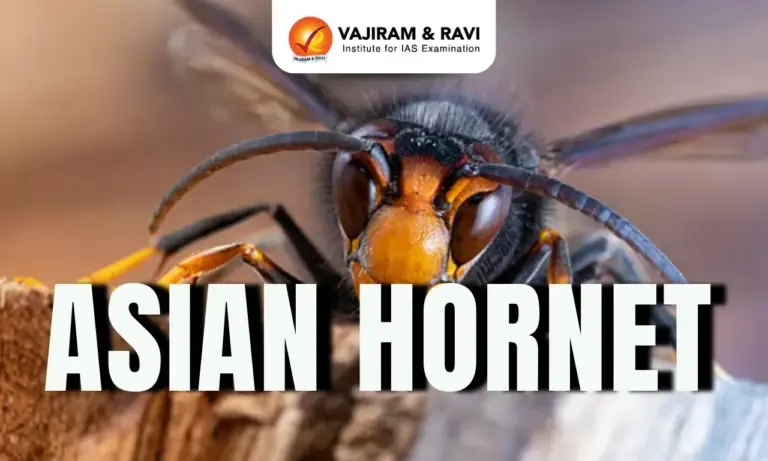Asian Hornet Latest News
In 2025, sightings of the hornet have surged dramatically, with evidence of the species breeding and overwintering in the UK for the first time, as confirmed by DNA studies.
About the Asian Hornet
- The Asian hornet (Vespa velutina), also known as the yellow-legged hornet, is an invasive species originally native to Southeast Asia.
- It is not the same as the Asian Giant Hornet (Vespa mandarinia), often wrongly labeled the “murder hornet.” While both are bee predators, the Asian hornet (Vespa velutina) is smaller but equally destructive in ecological terms.
- These hornets are predatory insects, feeding primarily on social bees and wasps, especially honeybees, which are critical pollinators in ecosystems.
- The Asian hornet’s specialised hunting tactics make it a lethal threat to honeybee colonies, as it can wait at hive entrances and kill bees mid-flight.
- Adult Asian hornets typically measure about 25 mm in length.
- They can be identified by their black velvety thorax, bright orange-yellow abdominal band, and distinctive yellow legs.
- Their sting is painful, and they are known for their aggressive behavior, especially around nests.
Invasion History and Spread
- The Asian hornet was first introduced to Europe in 2004, most likely via a shipment of Chinese pottery that brought a fertilised queen to France.
- Since then, the species has spread to 15 European countries, with France alone hosting over 500,000 nests.
- Britain recorded its first official detection of the Asian hornet in 2016.
Asian Hornet FAQs
Q1. What is the Asian Hornet and where is it native to?
Ans. The Asian Hornet (Vespa velutina) is an invasive wasp species native to Southeast Asia, known for preying on honeybees and disrupting local ecosystems.
Q2. Why is the Asian Hornet considered a threat in Europe?
Ans. The Asian Hornet is a major threat to European honeybee populations, which are vital for pollination and agriculture, leading to ecological and economic concerns.
Q3. How did the Asian Hornet spread to Europe?
Ans. The Asian Hornet was accidentally introduced to France via imported goods around 2004, and has since spread across much of Western Europe.
Source: DTE
Last updated on March, 2026
→ UPSC Notification 2026 is now out on the official website at upsconline.nic.in.
→ UPSC IFoS Notification 2026 is now out on the official website at upsconline.nic.in.
→ UPSC Calendar 2026 has been released.
→ UPSC Final Result 2025 is expected to be released soon.
→ Check out the latest UPSC Syllabus 2026 here.
→ Join Vajiram & Ravi’s Interview Guidance Programme for expert help to crack your final UPSC stage.
→ UPSC Mains Result 2025 is now out.
→ UPSC Prelims 2026 will be conducted on 24th May, 2026 & UPSC Mains 2026 will be conducted on 21st August 2026.
→ The UPSC Selection Process is of 3 stages-Prelims, Mains and Interview.
→ Prepare effectively with Vajiram & Ravi’s UPSC Prelims Test Series 2026 featuring full-length mock tests, detailed solutions, and performance analysis.
→ Enroll in Vajiram & Ravi’s UPSC Mains Test Series 2026 for structured answer writing practice, expert evaluation, and exam-oriented feedback.
→ Join Vajiram & Ravi’s Best UPSC Mentorship Program for personalized guidance, strategy planning, and one-to-one support from experienced mentors.
→ Check UPSC Marksheet 2024 Here.
→ UPSC Toppers List 2024 is released now. Shakti Dubey is UPSC AIR 1 2024 Topper.
→ Also check Best UPSC Coaching in India


















